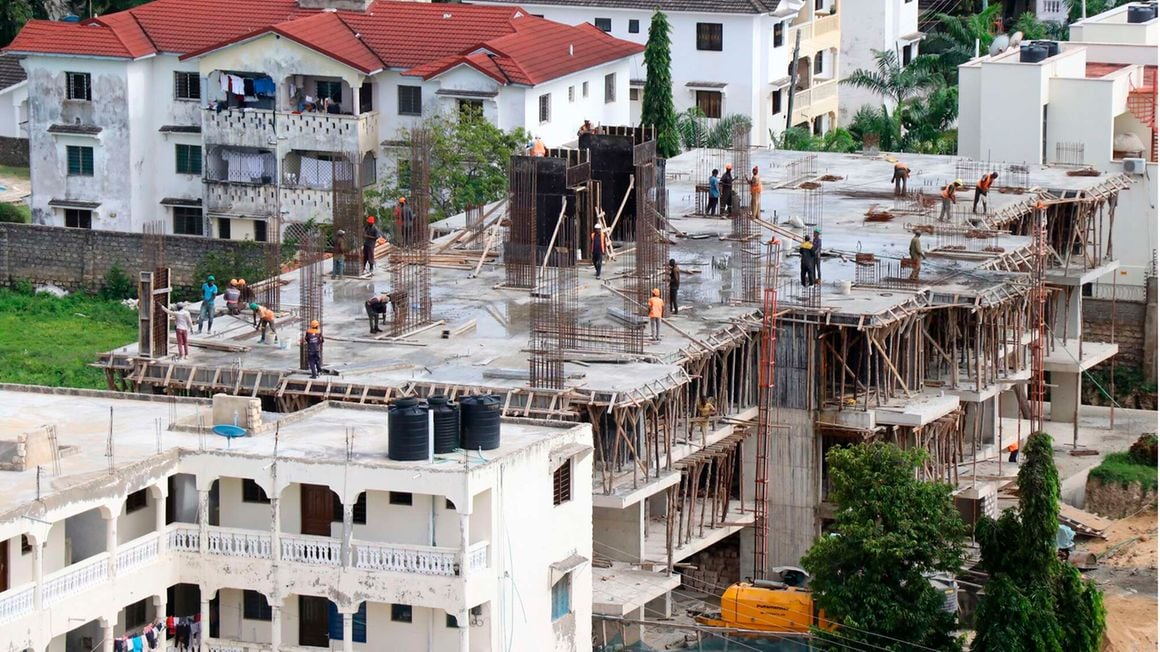In the coastal city of Mombasa, Kenya, the affluent neighborhood of Nyali has long been synonymous with luxury, tranquility, and spacious bungalows nestled amidst lush greenery.
Yet, a sweeping transformation is underway, reshaping the landscape and lifestyle of this prestigious estate.
The winds of change are blowing through Nyali, as high-rise buildings punctuate the skyline, standing as testaments to a shifting urban dynamic and the evolving aspirations of its inhabitants.
Not too long ago, Nyali’s zoning regulations painted a serene portrait of exclusivity, where stately mansions enjoyed ample space without the looming presence of towering apartment complexes.
The very fabric of Nyali’s charm was woven around privacy, ensuring that the serene Sunday afternoon by the pool remained free from prying eyes.
However, a wave of gradual change is sweeping through this once-preserved enclave, altering the very essence of its character.
Intriguingly, developers are now erecting high-rise buildings within Nyali’s confines, fundamentally altering its architectural identity.
These structures, some reaching impressive heights of up to 10 floors, are becoming interwoven with the existing landscape, juxtaposing modernity with tradition.
As the spatial dynamics shift, Nyali’s residents find themselves grappling with newfound challenges and choices.
For homeowners, the transformation has spurred a difficult decision – adapt or leave. Those who have long reveled in the tranquility and privacy of Nyali’s expansive bungalows now face the reality of change.
The option to sell and seek refuge in less crowded areas, such as Vipingo or Bofa in Kilifi, is increasingly appealing. The allure of solitude and space entices those who yearn for a return to the idyllic days of Nyali’s past.
A chorus of voices joins the discussion, each narrating their personal encounters with this evolving landscape. John Kariuki, a Mombasa businessman, shares his experience of trading his cherished Nyali bungalow for the tranquility of Vipingo.
“Where I lived in Nyali for the past 10 years, now sits a five-story building,” he laments. The sense of nostalgia underscores the changing contours of Nyali, where memories are woven into the fabric of its streets.
Jackeline Mbugua’s story echoes the financial realities of maintaining a vacant home in the face of changing times. The allure of her four-bedroom maisonette dimmed as towering apartments proliferated around it.
High maintenance costs and the encroaching shadow of modernity pushed her to sell, her cherished home transforming from a haven of luxury to a relic of the past.
Developers, however, argue that the transformation is a response to the changing socioeconomic landscape of Mombasa. The city’s burgeoning middle class and workforce demand housing that aligns with their urban lifestyles.
Apartments, with their efficient use of space and proximity to urban amenities, have become a natural fit for a city on the rise. Paul Kiagi, chairman of Pauland Properties Group, emphasizes the rising demand for housing from a middle class that seeks quality living without the burden of ownership.
The changing tides have also brought about a demand-supply shift.
Owning a piece of Nyali’s coveted real estate has become increasingly unattainable for many. As the middle class seeks affordable yet comfortable living spaces, apartments emerge as a viable alternative.
With property prices soaring, owning a bungalow in Nyali has become an exclusive privilege, forcing a significant portion of the population to look towards the high-rise horizon.
Amidst these transformations, concerns have arisen. The rapid proliferation of high-rise structures has exposed challenges in infrastructure management, particularly sewerage systems.
Overwhelmed by the burgeoning population, traditional systems struggle to cope. However, the resilience of human ingenuity comes to the forefront, as developers turn to technology, including bio-digesters, to tackle the issue head-on.
While Nyali’s physical landscape morphs, it also emerges as a bustling business hub.
The surge in population has given rise to shopping malls and attracted major retailers.
Naivas, Quickmart, and Carrefour have staked their claims, turning Nyali into a retail haven. The area’s newfound commercial vibrancy mirrors the broader transformational narrative, weaving modernity into the fabric of tradition.


